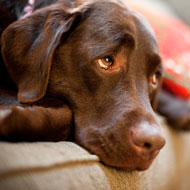PDSA report reveals poor pet care

“Many dogs will have enjoyed the busy Christmas period with lots of company, and suddenly, when everyone goes back to work, they are back to spending much of the day alone.”
Over two million dogs are left alone for five or more hours a day, on a standard week day, according to a recent report by the PDSA. On top of this, 1.6 million dogs are not walked everyday and around 94,000 dogs are not walked at all.
The PDSA’s Animal Wellbeing (PAW) Report found that many pets were facing loneliness, frustration and obesity. These emotions, caused by a lack of social interaction and exercise, often cause destructive and damaging behaviour.
PDSA vet, Rebecca Ashman, said: “Ideally, dogs shouldn’t be left alone for more than four hours on a typical day, so it’s hugely concerning that millions are routinely left alone for longer periods of time. Dogs are naturally very social animals and need companionship. Loneliness can be very harmful to their mental wellbeing.
“Many dogs will have enjoyed the busy Christmas period with lots of company, and suddenly, when everyone goes back to work, they are back to spending much of the day alone.”
The research also found that around 780,000 rabbits were living alone, despite them being highly sociable and needing a companion of their own species.
In addition to this, figures from the PAW report showed 2.3 million cats across the UK were sharing their homes with one or more cats that they don't get along with. Cats prefer to be the only one of their species in an enclosed environment, meaning that many cats could be suffering from chronic stress and other health issues.
Rebecca added: “Ninety-three per cent of owners told us that their pet makes them happy, so we are undoubtedly a nation who value and love our furry companions. But caring for a pet and ensuring you are providing for their needs can be very demanding. It’s important that you do your research before getting a pet, and make sure your chosen pet is right for you and your lifestyle. Your local vet is perfectly placed to help you with this important decision.
“Pet owners need to make sure they understand what their pet needs to be happy and healthy, and be certain that you can meet these needs on a daily basis. For example, do you have time to walk a dog every day? Do you have the space, resources and time to commit to two rabbits? While the nation may be feeling the ‘New Year blues’, it's important not to forget about keeping our pets happy too."



 The Veterinary Medicines Directorate (VMD) is inviting applications from veterinary students to attend a one-week extramural studies (EMS) placement in July 2026.
The Veterinary Medicines Directorate (VMD) is inviting applications from veterinary students to attend a one-week extramural studies (EMS) placement in July 2026.